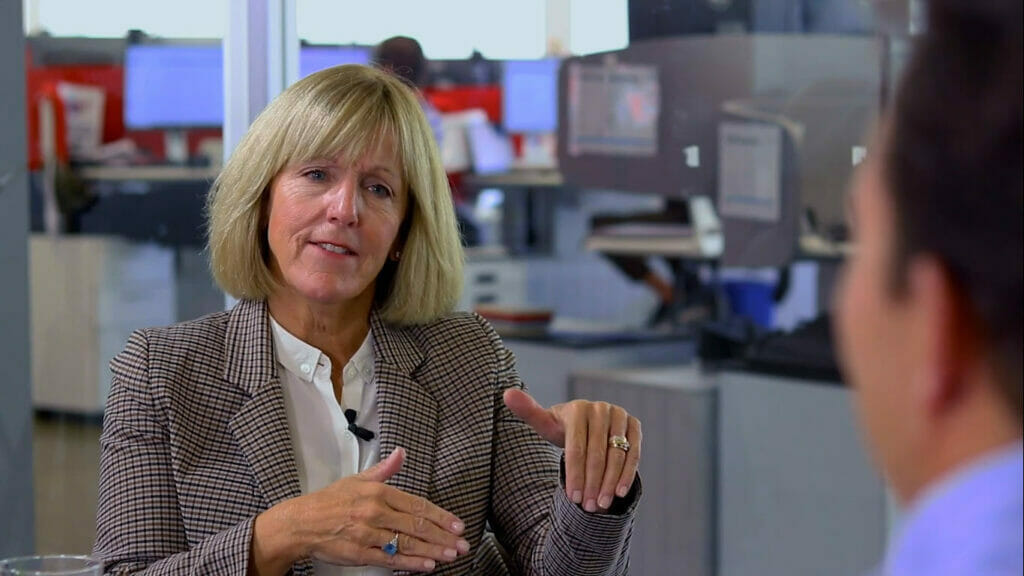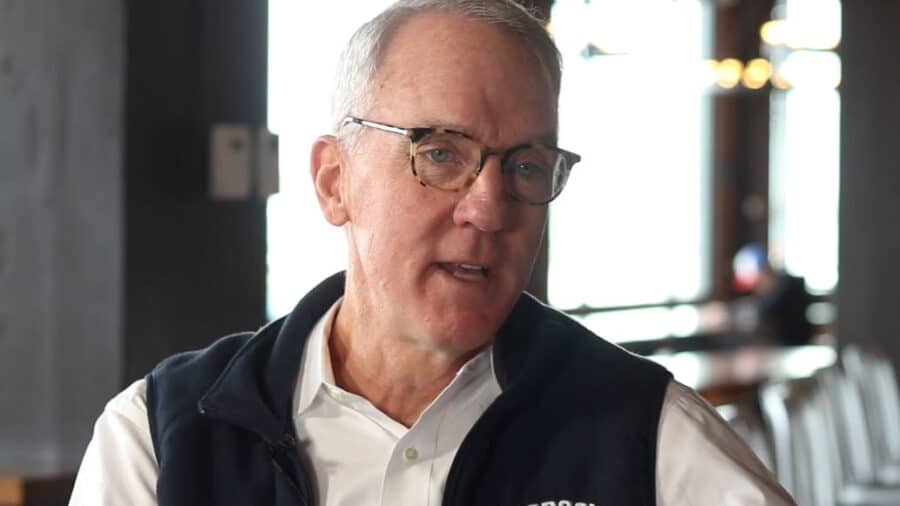Kirk Arnold is a three-time CEO, a lecturer at MIT’s Sloan School of Management, and an Executive in Residence at General Catalyst. She also serves as a board member for a variety of businesses, including Ingersoll Rand, Thomson Reuters, and The Predictive Index. As CEO of PI, I have the distinct pleasure of working with Kirk, and consider her both a mentor and friend.
With an industry-spanning resume that includes leadership roles in technology, education, energy, and financial services, Kirk is no stranger to managing successful businesses. Yet if there’s one throughline to her storied career, it’s this: Talent is everything.
I sat down with Kirk to discuss the importance of people to business success. Along the way, we talked about her path to becoming an executive, her mentorship under the great Jim Collins, and how Ingersoll Rand is making talent its competitive advantage.
IBM’s early investment in talent
Kirk knew talent was a competitive differentiator from the moment she entered the workforce. A Dartmouth graduate, she spent the first 11 years of her career at IBM. There, she learned firsthand what a “talent investment” could help an organization achieve.
“IBM knew they had to develop lots of people to go out and drive market growth,” she explained. “There wasn’t, in 1981, a huge supply of folks who wanted to go build and sell the enterprise technology they were selling.”
En route to becoming an industry juggernaut on par with modern-day Apple, IBM committed early on to the learning and development of its people. According to Kirk, that included something previously unheard of: a full year of training to ensure she was set up for success.
“I learned what it could mean as an employee to get that kind of investment,” she said.
As Kirk dedicated her talent to IBM, her loyalty was reciprocated throughout her tenure. Her story is one of constant development, frequent promotions, and opportunities seized. “I learned so much. Every time I gained mastery in one job, I got a new one,” she recalled.
That kind of talent-first mindset was rare then—and many would argue it’s still rare now. For Kirk, the experience had an indelible impact, inspiring both her leadership philosophy and her current outlook on organizational design.
From IBM to CSC, and beyond
When Kirk left IBM, she felt empowered to strike out on bigger, more daring adventures. That drive led to her next engagement—and some immediate headwinds.
“I stepped out of IBM and into a startup that was struggling. And, a year in, they actually shuttered the company. So I learned a lot of lessons. Some of your best talent development opportunities are when you’re in a company that’s struggling.”
She continued on, into the computer science sector. By then, at the age of 38, she was tapped to run a billion-dollar division of Computer Sciences Corporation (CSC), an international company dealing in IT services and consulting.
When asked what it was like to take charge of a division that, at the time, was 4,000-plus employees strong, Kirk replied matter-of-factly. “It was terrifying.”
She continued, “I was stretched beyond comprehension. I learned a lot, very quickly, and I benefited from really great mentors.”
That initial hesitancy is a natural feeling among leaders. In many ways, being humble and honest about your current skill set—and where you can grow—shows a level of emotional intelligence reserved only for the best of the best.
As a current lecturer at the MIT Sloan School of Management, Kirk often talks to her students about the value of self-awareness. “I’m constantly reminding folks that it’s OK to be looking at your role and saying, ‘Do I have the skills and ability to step into this? It’s healthy to be stretched like that.’”
Jim Collins, and the importance of talent
As Kirk grew into her leadership role at CSC, she had what she considered a truly formative experience. That pivotal moment came by way of a company presentation—and an unlikely mentor.
“I’m waiting to go up to the podium,” she explained. “I’m sitting with someone next to me; we’re chatting. It’s Jim Collins.”
The great Jim Collins—a lifelong academic, and the co-author of best-selling business book Built to Last. At the time, Collins was researching his next title, Good to Great, which both Kirk and I consider essential reading for any aspiring business leader.
“We get to talking about this role I was in, and how I was struggling to sort out the next phase of strategy,” Kirk continued. “And he looked at me and said, ‘Are you sure you have a strategy challenge, and not a team challenge?’”
Despite Kirk’s insistence that she had the right people on board, Jim persisted, inviting her to collaborate with him on his research. That partnership opened Kirk’s eyes to the importance of talent within organizational strategy, and kicked off a new era of leadership for CSC.
“It was clear we needed to supplement the talent we had around the table at the management level, and evolve where people were going to play a role,” said Kirk. “All the strategy thinking in the world was not going to be able to move us without that foundation.”
Now, nearly two decades after the release of Good to Great, Kirk is able to relate Jim’s teachings back to her time at CSC with even greater clarity. “It’s not just, ‘Are you on the bus that is committed to the work and to the culture?’ but, ‘Are you in the right seat?’”

Ingersoll Rand’s competitive advantage
Long after Jim’s mentorship, Kirk continues to iterate on that talent-first mindset. Since CSC, her career has seen her take on executive roles in industries such as tech and financial services. In recent years, she has added the title of Board Member to her illustrious resume.
It’d have been impossible to do justice to all of these accomplishments in a single interview. Instead, I was curious to hear how Kirk continues to apply her learnings as an acting board member for Ingersoll Rand.
“For a long time, all we could do for manufacturers was make [them] more efficient. Suddenly, with IoT and all this amazing data, we can change the offering. We can help industrial companies add value to their product and reposition themselves in the market.
“I wanted to learn more about what that was all about,” she continued. “And I discovered this team at Ingersoll Rand. What I learned is that the leader—Mike Lamach, who is one of the greats—starts with the team, first thing.
“We spend time in board meetings, digging into the talent, how to develop the talent, how to ensure there’s diversity in the talent… It’s amazing.”
If there’s one takeaway Kirk has noted from her time at Ingersoll Rand, it’s that the right team can bolster any operation, no matter the optics.
“I brought this bias about tech being all about innovation, that maybe manufacturing was more about scale,” Kirk shared. “But it’s a universal truth: Great teams kill, in every segment.”
Paving the way for diversity in tech
Ingersoll Rand is just one team Kirk is helping to guide and mentor. From her non-profit work as part of the Mass Technology Leadership Council, to serving on the board here at The Predictive Index, Kirk has been an invaluable asset in the tech world and beyond.
Yet, it’s no secret the tech industry still has work to do—particularly with diversity and inclusion. Women and minorities continue to face implicit bias, unequal opportunity, and a lack of upward mobility.
I asked Kirk what it has meant to have this storied career, and what she views as the biggest obstacles to progress today.
“Mike,” she said, “this is my centerpiece. ‘How do we bring diversity to all dimensions of business?’”
She continued, “What drew me to technology, when I started, was it was a young industry. And I assumed, because it was young, that it wouldn’t have some of the traditional biases that existed in, say, manufacturing or financial services.
“The truth is, we somehow haven’t moved the dial on the question: ‘How do we get more women to aspire to technology careers, and then break through the leadership ranks?’”
I asked Kirk what advice she’d give other women looking to chart their own path in tech. In her words: “There’s opportunity for you. It is very important to find a culture and company that feels right to you. There are great, great companies trying to do the right thing.”
Kirk and I both firmly believe talent drives business success. But that success only occurs when people are in roles where their skills and drives are valued. That’s what talent optimization is all about: empowering business leaders to build a workplace where everyone can thrive.
“It’s a universal truth: Great teams kill, in every segment.”
– Kirk Arnold
A constant teacher and mentor
As we wrapped our interview, there was still so much to discuss with Kirk. She serves as an Executive in Residence (XIR) at General Catalyst, which is at the tip of the spear with technology in this evolving workplace. She also lectures at MIT and Carnegie Mellon, with the hopes of mentoring future leaders in tech.
“Some of the talent magic comes from ensuring that our first-line management teams can be the coach and mentor of these folks. And if I can be one of those people, I’m happy to do that.”
I can attest to Kirk’s leadership and foresight. We’ve worked together since 2019, when Kirk first stepped onto the board of The Predictive Index. Since then, she’s been helping us make our mission of Better Work, Better World a reality, day by day.
While in many respects I see Kirk as my boss, she views our relationship differently. In fact, the entire paradigm between boards and leadership teams is shifting.
“Our singular focus on the investor is moving. As a board, we have a commitment to more stakeholders—to our customers and, maybe most importantly, to the management and employee base—to represent what that team needs and wants.
“It has never been easy to find talent,” she added. “As a board, to ensure we’re doing everything we can to help companies retain and develop that talent, I think that’s a really good sign.”
For more on my conversation with Kirk, check out our video interview.


